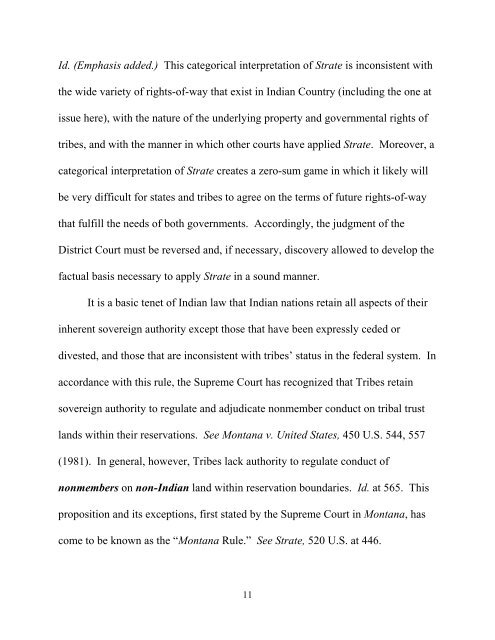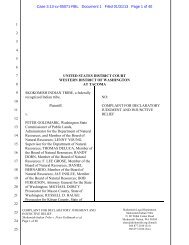Appellant Brief - Turtle Talk
Appellant Brief - Turtle Talk
Appellant Brief - Turtle Talk
You also want an ePaper? Increase the reach of your titles
YUMPU automatically turns print PDFs into web optimized ePapers that Google loves.
Id. (Emphasis added.) This categorical interpretation of Strate is inconsistent with<br />
the wide variety of rights-of-way that exist in Indian Country (including the one at<br />
issue here), with the nature of the underlying property and governmental rights of<br />
tribes, and with the manner in which other courts have applied Strate. Moreover, a<br />
categorical interpretation of Strate creates a zero-sum game in which it likely will<br />
be very difficult for states and tribes to agree on the terms of future rights-of-way<br />
that fulfill the needs of both governments. Accordingly, the judgment of the<br />
District Court must be reversed and, if necessary, discovery allowed to develop the<br />
factual basis necessary to apply Strate in a sound manner.<br />
It is a basic tenet of Indian law that Indian nations retain all aspects of their<br />
inherent sovereign authority except those that have been expressly ceded or<br />
divested, and those that are inconsistent with tribes’ status in the federal system. In<br />
accordance with this rule, the Supreme Court has recognized that Tribes retain<br />
sovereign authority to regulate and adjudicate nonmember conduct on tribal trust<br />
lands within their reservations. See Montana v. United States, 450 U.S. 544, 557<br />
(1981). In general, however, Tribes lack authority to regulate conduct of<br />
nonmembers on non-Indian land within reservation boundaries. Id. at 565. This<br />
proposition and its exceptions, first stated by the Supreme Court in Montana, has<br />
come to be known as the “Montana Rule.” See Strate, 520 U.S. at 446.<br />
11

















